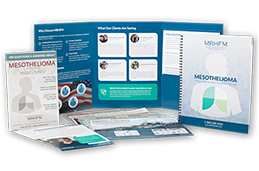Phase 2 Study of Chemoperfusion Treatment with Cisplatin in Patients with Malignant Pleural Mesothelioma Recruiting
The H. Lee Moffitt Cancer Center & Research Institute in Tampa, Florida, is currently recruiting participants for a Phase 2 Study of Transarterial Chemoperfusion Treatment with Cisplatin, Methotrexate and Gemcitabine in Patients with Unresectable Pleural Mesothelioma. Per the Center, the purpose of the study is to determine whether the transarterial chemoperfusion (TACP) treatment with cisplatin (TCTC), methotrexate and gemcitabine is safe and effective in adults with malignant pleural mesothelioma (MPM).
The study will also assess overall survival (OS), progression free survival (PFS), and quality of life in patients with MPM treated with TCTC. The study also seeks to determine the frequency and severity of adverse events related to TACP with cisplatin, methotrexate and gemcitabine during the chemoperfusion phase and follow-up phase of the study.
Drugs used in chemotherapy, such as cisplatin, methotrexate and gemcitabine, work in different ways to stop the growth of tumor cells by killing the cells, stopping them from spreading or stopping them from dividing. TACP is a procedure that allows chemotherapy agents, such as cisplatin, methotrexate and gemcitabine, to be directly injected into the arteries that supply blood to the area where the tumor is located.
The study is open to men and women 18 years of age or older with the following main inclusion criteria:
- Must have histologically or cytologically confirmed malignant pleural mesothelioma (MPM).
- Must have unresectable MPM or the patient refuses surgery for resectable MPM.
- Must have failed to respond first line standard of care chemotherapy or the patient refuses first line chemotherapy.
- Must have measurable disease, by computed tomography (CT) or magnetic resonance imaging (MRI) per modified Response Evaluation Criteria in Solid Tumors (RECIST) for mesothelioma. Radiographic tumor assessment must be performed within 28 days prior to the first treatment.
- The predominant burden of disease lies in an arterial distribution, which is accessible for transarterial chemoperfusion treatment.
The Phase 2 study is led by Bela Kis, MD, PhD, who specializes in image-guided tumor therapy, biopsies, and urinary and biliary interventions; arterial and venous stenting, uterine fibroid embolization, pelvic congestion syndrome and varicose veins, vertebroplasty, and kyphoplasty. In addition to the Phase 2 study, Dr. Kis is the lead researcher on at least two other trials involving patients with other aggressive types cancer. These trials are also currently recruiting.
Phase 2 studies take around two years to complete and they usually have anywhere from 30 to 120 participants. However, researchers may assign participants different doses of the treatment, called a “randomized phase II trial.” This type of trial may include up to several hundred patients.
The Phase 2 TCTC study shows promise and researchers are hopeful that it will move to Phase 3. Per the American Society of Clinical Oncology (ASCO), during this phase, researchers compare the treatment of care for that disease with two or more other treatment options. Phase 3 studies may include data from hundreds, if not thousands of people from different ethnicities, ages, and both genders. “This helps doctors apply the results to a larger number of people.”
Though Phase 3 studies often take years to complete, once the treatment has been proven to “work well against a specific cancer, doctors can apply for FDA approval.” If FDA standards are met, the Administration approves the treatment for specific use.
Sources
"Bela Kis, MD, PhD." Moffitt Cancer Center. H. Lee Moffitt Cancer Center & Research Institute, 2017. Web. 03 May 2017.
Cancer.Net, Editorial Board. "Phases of Clinical Trials." Cancer.Net. American Society of Clinical Oncology (ASCO), 10 Dec. 2015. Web. 03 May 2017.
"Clinical Trial 18094 - A Phase 2 Study of Transarterial Chemoperfusion Treatment with Cisplatin, Methotrexate and Gemcitabine in Patients with Unresectable Pleural Mesothelioma." Moffitt Cancer Center. H. Lee Moffitt Cancer Center & Research Institute, 2017. Web. 03 May 2017.
Phases of Clinical Trials - An Introduction, with Neal Meropol, MD. Perf. Neal J. Meropol, MD, FASCO. Cancer.Net. American Society of Clinical Oncology (ASCO), Dec. 2015. Web. 03 May 2017.
"Transarterial Chemoperfusion: Cisplatin, Methotrexate, Gemcitabine for Unresectable Pleural Mesothelioma." National Cancer Institute (NCI). National Institutes of Health (NIH), U.S. Department of Health and Human Services (HHS), 2017. Web. 03 May 2017.



